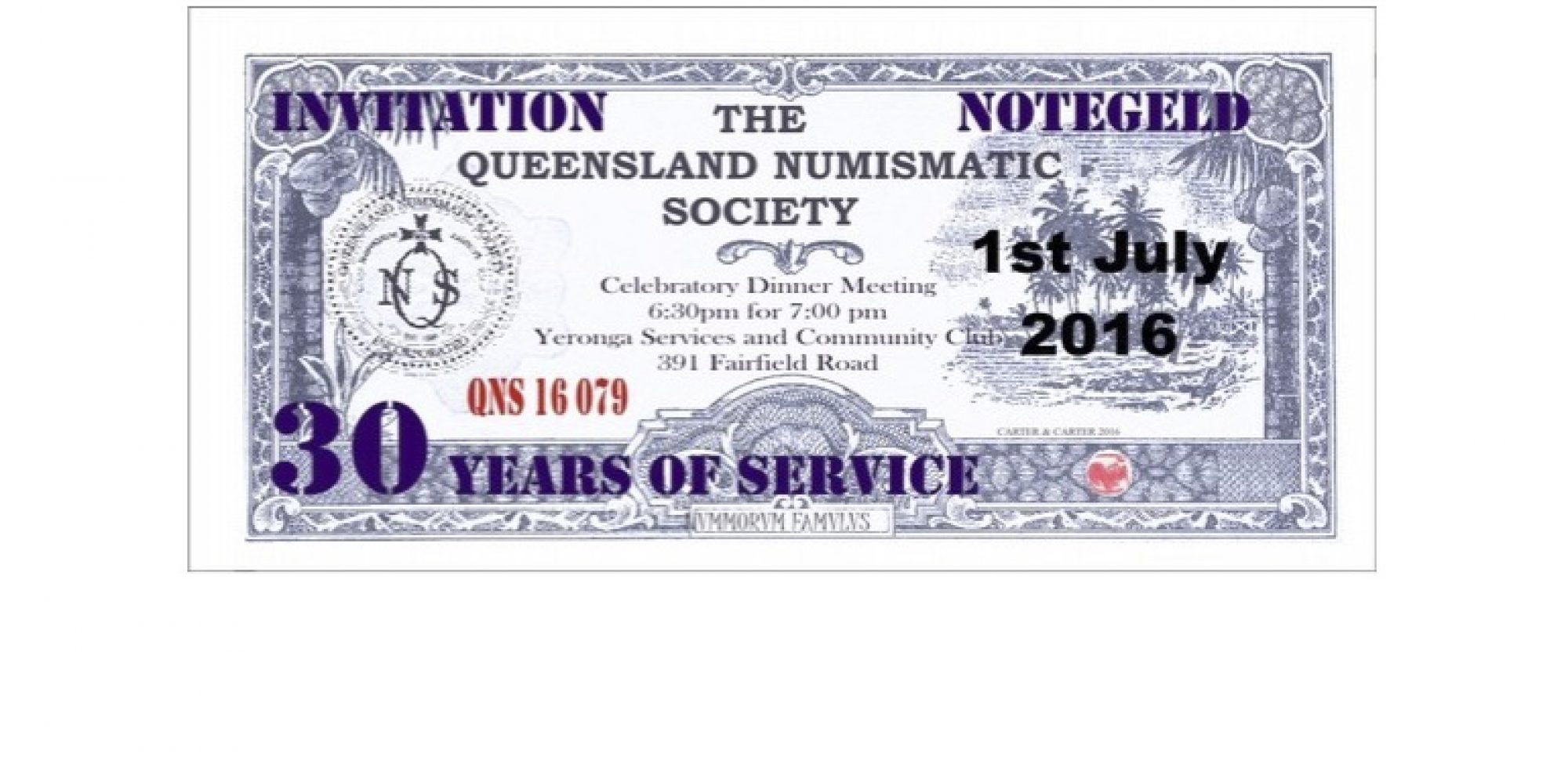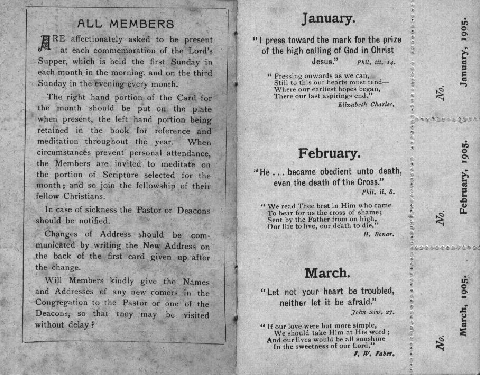by Melvin Williams
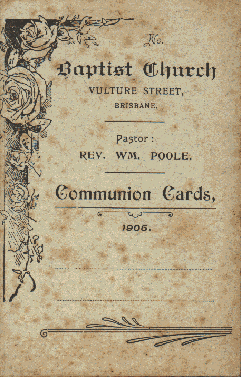
The three books of communion tokens pictured in this article were handed to me for comment by the Secretary of our society, Stephen Appleton, knowing they would be of interest to me. They certainly were, not only because of the clear evidence of such tokens being used, but also because the South Brisbane Baptist Church hall is the current meeting-place for the society. What secrets lurk in church back cupboards? But more of the tokens later.
BAPTIST COMMUNION TOKENS

During the 17th, 18th, and 19th centuries communion tokens were used predominantly in Scottish-related Presbyterian churches. They were usually made of lead or white metal, occasionally of copper or silver. However a number of Scottish churches retained their allegiance to bishops rather than the presbyterian system of elders, and became part of the Episcopal Church of Scotland (Anglican). Several of these churches used communion tokens. Methodists were not strong in Scotland, but three Methodist communion tokens are listed by R Dick. Although Baptists in Scotland often adopted a presbyterian form of local church government rather than the more common congregational form, only one church issued a communion token, the LOCHEE BAPTIST CHAPEL in Dundee, illustrated to right. None are known for the American or other British colonies. So there is no history of Baptist churches using communion tokens before the 20th century.
TWENTIETH CENTURY DEVELOPMENTS

By the 1900’s most Presbyterian churches both in Scotland and the colonies had dropped the use of communion tokens though their use continued in some outlying parts of Scotland and more frequently among the Free Church of Scotland churches. The same was true in Australia where Free churches which did not join the union of Presbyterian churches in 1865 continued their separate existence. Some of these churches replaced metal tokens with cardboard tokens, such as the one from Grafton shown here. Possibly cardboard tokens exist for some Presbyterian churches which did join the union but are not so far known to me. There are many ‘reminder’ type communion cards but these though derived from communion tokens are not the same thing as tokens (which were collected at the communion service).

Now for a Baptist surprise. The paper token shown at right was used by the Sydney Baptist church (located in Bathurst St., but now Sydney Central, in George St.), is dated 1883 and includes a church membership number. There is no mention of the practise in A.C. Prior’s history of New South Wales Baptists. The minister at the time was the Rev W.M. Clare (1881-1884) who retired from illness in August 1884, so their use was probably confined to one or two years. I confess to being unsure as to how they were used until the appearance of the South Brisbane tokens and communion record book.

The only Baptist church in Queensland previously known to have used communion tokens was Jireh church in Fortitude Valley. This church was established in 1861 in a strict Calvinist tradition, and so with restricted views on who was eligible to attend communion; an example of their token is illustrated below. Yet even here the use of communion tokens was soon discontinued.
SOUTH BRISBANE BAPTIST CHURCH
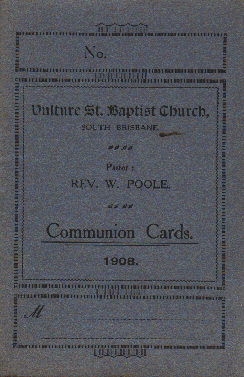
In the early years of South Brisbane as a town (and even a rival to North Brisbane for a short time) Baptists worshipped happily at either the Presbyterian or Congregational churches. A Baptist lay preacher, Mr Ebenezer Hooker, ministered at the Presbyterian church for a prolonged period. Though a Sunday school was started as early as 1857 it was 1872 before a church was officially formed. The membership included several persons prominent in business and the community. Well-known names included Ebenezer Hooker, unofficial pastor, Samuel Grimes, (MLA for 24 years) church secretary, T. B. Stephens (businessman and land owner) church treasurer, and Richard Kingsford (merchant) deacon (see my Cameos book). Initial services were held in the Mechanics Institute but a church building in Vulture St was opened in 1874.
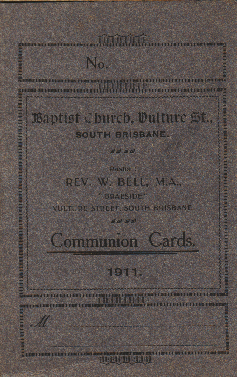
Over the years the church has been fortunate with its ministry. The Rev. William Poole ministered for 30 years (1880-1911); the Rev. William Bell M.A. (1912-31); the Rev P.F. Lanyon (1932- 35); the Rev T.C. Warriner M.A.(1937- 39), who later became Principal of the Baptist Theological College. During its heyday the church began or encouraged churches in newer areas to the south such as Fairfield and Thompson Estate. The old building was reconstructed in 1961 during the ministry of the Rev Norman Mergard (1961-1977) whose good business sense served the church well. Today with the changed character of the area and inner suburban status the now small church continues its witness.
Though the church would not have been classed among the stricter variety of Baptist churches at any time in its history the communion rollbook shows that attendance at the monthly communion service was considered very important.
Members were issued with a number and book of tokens to cover the calendar year. For each month there was a thought for the month. Members would insert their number and tear off the token which would be collected during the communion service and later entered against their number in the record book. Those missing three services in a row could have their membership suspended or cancelled altogether. This practise was introduced by the Rev William Poole in 1896 and continued till after World War I.
(The only surviving ‘spare’ copies of these communion books in the church archive are dated 1905, 1908 and 1911. Quite why these three years are present in quantity, and no others, is uncertain. – S.Ap.)
These days an open invitation is given to all Christians to partake in the communion service but the tokens are a reminder of an earlier more regimented era.
References:
R Dick Scottish Communion Tokens (non – established churches) 1902
A C Prior Some Fell on Good Ground 1966
J E White A Fellowship of Service 1977
M C Williams Cameos of Baptist Men 1995
E Sands South Brisbane Baptist Church 100th Anniversary 1972
